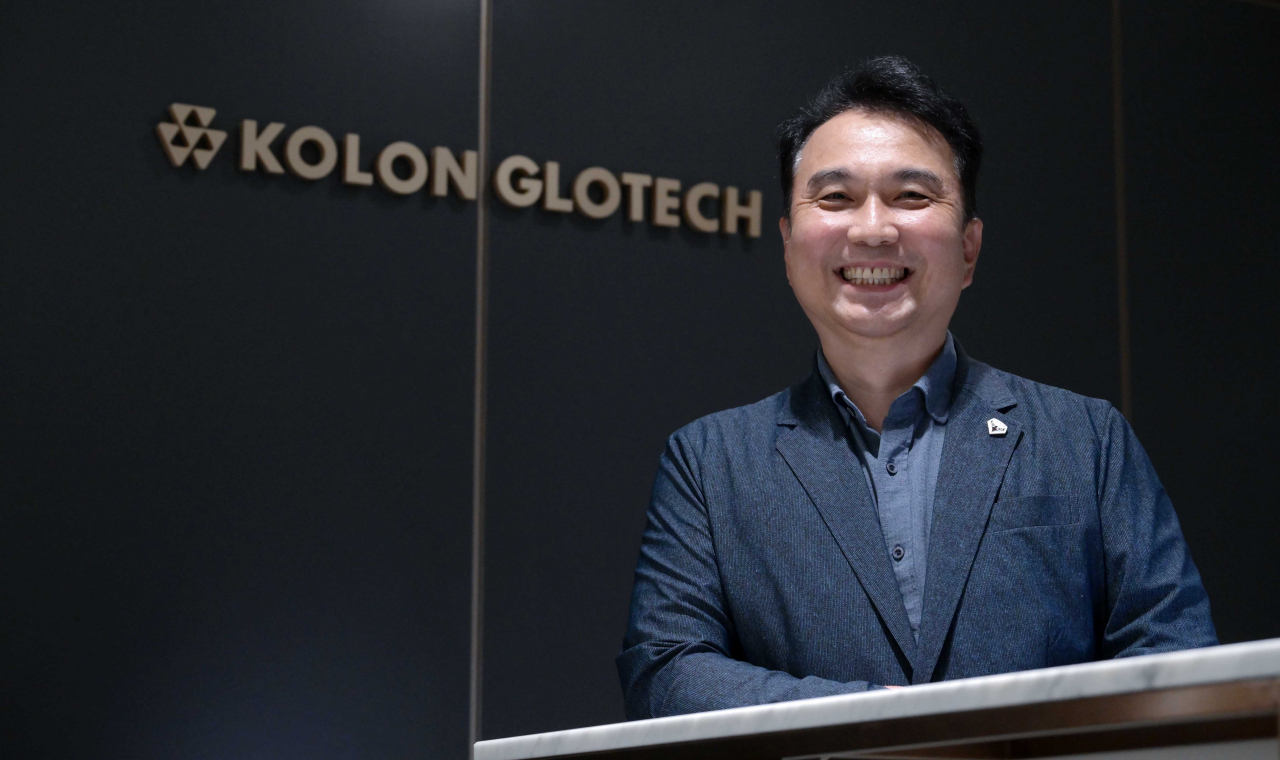[Beyond Earth] Kolon aims to become global space parts supplier
S. Korean chemical and textile conglomerate focused on developing space parts made of composite materials
By Kan Hyeong-wooPublished : June 19, 2023 - 15:28

Kolon Group, a South Korean chemical and textile conglomerate, is looking to become a global space parts supplier as it continues to build upon its strength of developing and manufacturing composite materials.
“Our business is to supply all parts that are made up of composite materials, so we are developing technologies that can produce composite-materials-made components that go into a space launch vehicle,” said Bang Min-soo, CEO of Kolon Glotech, in an interview with The Korea Herald at the Kolon Group headquarters in Seoul, on June 12. Kolon Glotech is an integrated manufacturer of various materials.
“Starting with Korea’s own space launch vehicles to build on trust, the bigger picture is to go global and work with space leaders such as SpaceX in the future,” he added.
Kolon’s domestic partners include Innospace, a hybrid rocket startup, and Nara Space, a small satellite developer and satellite imagery service provider.
Kolon Glotech and Kolon Investment have invested a total of 10.8 billion won ($8.47 million) in Innospace as the largest external investor with a 17.7 percent stake. Kolon Glotech took part in Nara Space’s series A investment worth 10 billion won along with several other investors in August 2020.
Touting Innospace’s Hanbit-TLV launch -- the first successful launch of a space launch vehicle in the Korean private sector -- in March, Bang said the hybrid rocket used parts that were developed and produced by the composite materials technology of Kolon Glotech and Kolon DACC Composite, a company specializes in making composite parts and modules used in the aerospace, defense and urban mobility sectors.
“Lightening the weight of a space rocket is very important. For instance, the weight of the rocket’s (payload fairing) has been decreased by 40 percent if we manufacture it with composite materials,” he said.
The CEO noted that launching a 50-kilogram satellite into orbit currently costs about 2.5 billion won, reemphasizing the cost-effectiveness of building a lighter space launch vehicle.
Besides the payload fairing, the composite materials parts that Kolon Glotech either has commercialized or is working to develop include propellant tanks, oxidizer tanks, combustion tubes, nozzles, fuselage, interstages and satellite structures.
Rocket parts made of composite materials are also highly valued in the space industry due to extreme heat resistance and high-pressure resistance.
The demand for space launch vehicles is expected to grow immensely. According to market intelligence firm Euroconsult, which specializes in the space sector, 24,500 satellites worldwide are projected to be launched into space between 2022 and 2031, creating manufacturing and launch revenues of $400 billion.

“I can tell you that the level of Kolon DACC Composite’s technology is world-best. DACC Composite joined the Kolon Group in 2015, but the company has been around for over 20 years. For instance, DACC builds submarine shells, which are made of composite materials. It also supplies missile wings,” said Bang. Kolon Glotech acquired a 75.5 percent stake worth 20 billion won in DACC Composite to take over the company in 2015.
During Kolon’s 69-year history, the firm has developed the capability to self-produce materials used in composite materials such as epoxy resins and aramid fibers. This means the group has a fully internal supply chain that is capable of meeting the high demands of the global space industry, the CEO said.
Bang underlined the necessity to look long-term with space businesses in order to complete the full process from the research and development stages to commercialization.
“In terms of manufacturing businesses, especially for those who prepare to do businesses that will grow in the future, the investment has to be carried out over a long period of time,” he said.
Having worked at Kolon for 33 years, he has witnessed projects that have taken 15 years or longer to come to fruition and "turned out really successful," he added.
According to Kolon, a space business task force has been formed across the group’s affiliates including Kolon Industries and Kolon Global to discuss space strategies beyond the composite materials sector.
“There have been more discussions about how certain space technologies can be applied in industrial materials or consumer products so far. We are doing research on space itself but we are also talking about how we could use space technology to do other businesses,” said Bang.





![[Weekender] How DDP emerged as an icon of Seoul](http://res.heraldm.com/phpwas/restmb_idxmake.php?idx=644&simg=/content/image/2024/04/25/20240425050915_0.jpg&u=)



![[Music in drama] An ode to childhood trauma](http://res.heraldm.com/phpwas/restmb_idxmake.php?idx=644&simg=/content/image/2024/04/25/20240425050929_0.jpg&u=)









![[Herald Interview] Mistakes turn into blessings in street performance, director says](http://res.heraldm.com/phpwas/restmb_idxmake.php?idx=652&simg=/content/image/2024/04/28/20240428050150_0.jpg&u=20240428174656)
